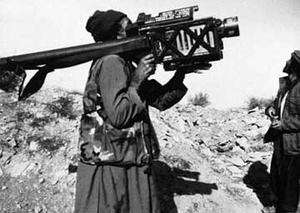Libya updateRebels may sell missiles to finance campaign
In a congressional testimony, General Carter Ham, commander of the U.S. Africa Command, underscored the threat from shoulder-fired missiles looted from Libyan arms depots; Gen. Ham estimated that 20,000 of these missiles may have been in Libya at the time of the uprising; carried and fired by a single fighter, these missiles travel at supersonic speeds from a shoulder-fired launcher toward the heat signature of an aircraft engine, where they detonate

Mujahid with U.S.-made Stinger missile // Source: chinadaily.com.cn
We wrote last week about the Israeli commando operation in Sudan, in which two Hamas operatives were killed. The operatives were on their way to arrange the transfer to Hamas and Hezbollah of a thousand or so chemical munitions. The munitions – shells filled with nerve and mustard gas – were found by anti-Gaddafi rebels in abandoned Libyan military bases in eastern Libya. Iran offered the rebels money to purchase to munitions on behalf of Hamas and Hezbollah.
Chemical munitions are not the only dangerous weapons being sold by the rebels. During a hearing of the Senate Armed Services Committee last Thursday, General Carter Ham, commander of the U.S. Africa Command, underscored the threat from shoulder-fired missiles looted from Libyan arms depots. Gen. Ham estimated that 20,000 MANPADS (Man-Portable Air-Defense Systems) may have been in Libya at the time of the uprising, and that the United States will “…take action to get those out of extremist hands.”
Carried and fired by a single fighter, these MANPADS travel at supersonic speeds from a shoulder-fired launcher toward the heat signature of an aircraft engine, where they detonate. MANPADS, heat-seeking antiaircraft missiles, could be used against civilian planes.
If you want to know more, a good source would be Matt Schroeder, director of the Arms Sales Monitoring Project at the Federation of American Scientists. He is available to discuss the terrorist threat posed by shoulder-fired missiles and the prospects for recovering the missiles from the black market. Matt has studied previous U.S. programs to recover loose missiles in Afghanistan and elsewhere, and can discuss the “lessons learned” from these efforts and how they apply to Libya.
